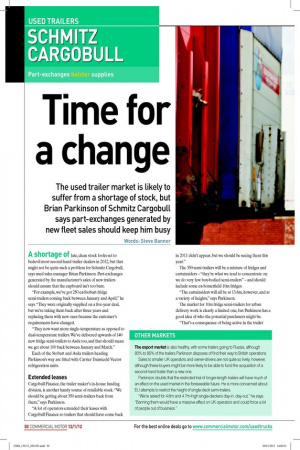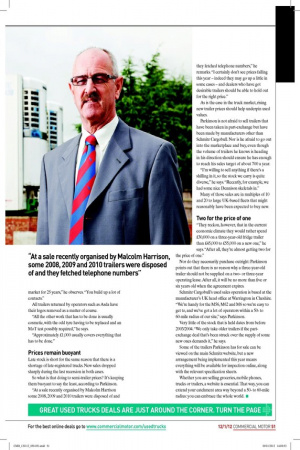Time for a change
Page 41

Page 42

If you've noticed an error in this article please click here to report it so we can fix it.
USED TRAILERS
SCHMITZ CARGOBULL
Part-exchanges bolster supplies
The used trailer market is likely to suffer from a shortage of stock, but Brian Parkinson of Schmitz Cargobull says part-exchanges generated by new fleet sales should keep him busy
Words: Steve Banner A shortage of late, clean stock looks set to bedevil most second-hand trailer dealers in 2012, but that might not be quite such a problem for Schmitz Cargobull, says used sales manager Brian Parkinson. Part-exchanges generated by the manufacturer’s sales of new trailers should ensure that the cupboard isn’t too bare.
“For example, we’ve got 250 ex-Stobart fridge semi-trailers coming back between January and April,” he says. “They were originally supplied on a ive-year deal, but we’re taking them back after three years and replacing them with new ones because the customer’s requirements have changed.
“They now want more single-temperature as opposed to dual-temperature trailers. We’ve delivered upwards of 140 new fridge semi-trailers to Asda too, and that should mean we get about 100 back between January and March.” Each of the Stobart and Asda trailers heading Parkinson’s way are itted with Carrier Transicold Vector refrigeration units.
Extended leases
Cargobull Finance, the trailer maker’s in-house funding division, is another handy source of retailable stock. “We should be getting about 350 semi-trailers back from them,” says Parkinson.
“A lot of operators extended their leases with Cargobull Finance so trailers that should have come back in 2011 didn’t appear, but we should be seeing them this year.” The 350 semi-trailers will be a mixture of fridges and curtainsiders – “they’re what we tend to concentrate on: we do very few box-bodied semi-trailers” – and should include some ex-Somerield 10m fridges.
“The curtainsiders will all be at 13.6m, however, and at a variety of heights,” says Parkinson.
The market for 10m fridge semi-trailers for urban delivery work is clearly a limited one, but Parkinson has a good idea of who the potential purchasers might be.
“That’s a consequence of being active in the trailer market for 25 years,” he observes. “You build up a lot of contacts.” All trailers returned by operators such as Asda have their logos removed as a matter of course.
“All the other work that has to be done is usually cosmetic, with the odd tyre having to be replaced and an MoT test possibly required,” he says.
“Approximately £1,000 usually covers everything that has to be done.”
Prices remain buoyant
Late stock is short for the same reason that there is a shortage of late-registered trucks. New sales dropped sharply during the last recession in both cases.
So what is that doing to semi-trailer prices? It’s keeping them buoyant to say the least, according to Parkinson.
“At a sale recently organised by Malcolm Harrison some 2008, 2009 and 2010 trailers were disposed of and they fetched telephone numbers,” he remarks. “I certainly don’t see prices falling this year – indeed they may go up a little in some cases – and dealers who have got desirable trailers should be able to hold out for the right price.” As is the case in the truck market, rising new trailer prices should help underpin used values.
Parkinson is not afraid to sell trailers that have been taken in part-exchange but have been made by manufacturers other than Schmitz Cargobull. Nor is he afraid to go out into the marketplace and buy, even though the volume of trailers he knows is heading in his direction should ensure he has enough to reach his sales target of about 700 a year.
“I’m willing to sell anything if there’s a shilling in it, so the stock we carry is quite diverse,” he says. “Recently, for example, we had some nice Dennison skeletals in.” Many of those sales are in multiples of 10 and 20 to large UK-based leets that might reasonably have been expected to buy new.
Two for the price of one
“They reckon, however, that in the current economic climate they would rather spend £30,000 on a three-year-old fridge trailer than £45,000 to £55,000 on a new one,” he says. “After all, they’re almost getting two for the price of one.” Nor do they necessarily purchase outright: Parkinson points out that there is no reason why a three-year-old trailer should not be supplied on a twoor three-year operating lease. After all, it will be no more than ive or six years old when the agreement expires.
Schmitz Cargobull’s used sales operation is based at the manufacturer’s UK head ofice at Warrington in Cheshire. “We’re handy for the M56, M62 and M6 so we’re easy to get to, and we’ve got a lot of operators within a 50to 60-mile radius of our site,” says Parkinson.
Very little of the stock that is held dates from before 2003/2004. “We only take older trailers if the partexchange deal that’s been struck over the supply of some new ones demands it,” he says.
Some of the trailers Parkinson has for sale can be viewed on the main Schmitz website, but a new arrangement being implemented this year means everything will be available for inspection online, along with the relevant speciication sheets.
Whether you are selling groceries, mobile phones, trucks or trailers, a website is essential. That way, you can extend your catchment area way beyond a 50to 60-mile radius: you can embrace the whole world. ■
OTHER MARKETS
The export market is also healthy, with some trailers going to Russia, although 80% to 85% of the trailers Parkinson disposes of find their way to British operations.
Sales to smaller UK operators and owner-drivers are not quite so lively, however, although these buyers might be more likely to be able to fund the acquisition of a second-hand trailer than a new one.
Parkinson doubts that the restricted trial of longer-length trailers will have much of an effect on the used market in the foreseeable future. He is more concerned about EU attempts to restrict the height of single-deck semi-trailers.
“We’re asked for 4.6m and 4.7m-high single-deckers day-in, day-out,” he says. “Banning them would have a massive effect on UK operators and could force a lot of people out of business.”












































